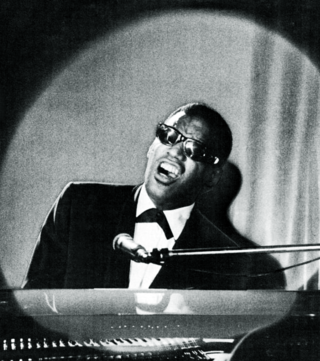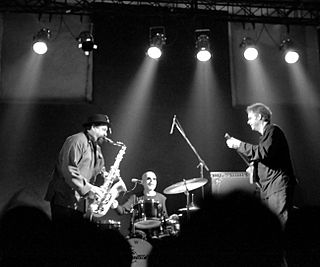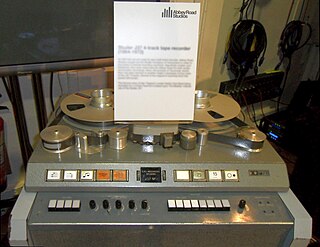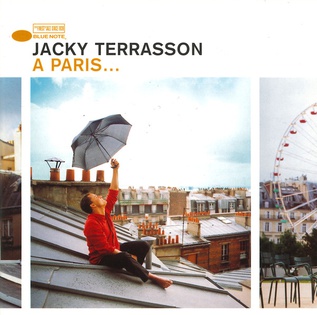Related Research Articles

Soul music is a popular music genre that originated in the African-American community throughout the United States in the late 1950s and early 1960s. It has its roots in African-American gospel music and rhythm and blues. Soul music became popular for dancing and listening, where U.S. record labels such as Motown, Atlantic and Stax were influential during the Civil Rights Movement. Soul also became popular around the world, directly influencing rock music and the music of Africa. It also had a resurgence in the mid-to late 1990s with the subgenre neo-soul, which added modern production elements and influence from hip-hop.

Clifford Benjamin Brown was an American jazz trumpeter, pianist and composer. He died at the age of 25 in a car crash, leaving behind four years' worth of recordings. His compositions "Sandu", "Joy Spring", and "Daahoud" have become jazz standards. Brown won the DownBeat magazine Critics' Poll for New Star of the Year in 1954; he was inducted into the DownBeat Hall of Fame in 1972.
MFSB, officially standing for "Mother Father Sister Brother", was a pool of more than 30 studio musicians based at Philadelphia's Sigma Sound Studios. They worked closely with the production team of Gamble and Huff and producer/arranger Thom Bell, and backed up Harold Melvin & the Blue Notes, the O'Jays, the Stylistics, the Spinners, Wilson Pickett, and Billy Paul.

Stephen Paul Motian was an American jazz drummer, percussionist, and composer. He played an important role in freeing jazz drummers from strict time-keeping duties.
Italo disco is a music genre which originated in Italy in the late 1970s and was mainly produced in the 1980s. Italo disco evolved from the then-current underground dance, pop, and electronic music, both domestic and foreign and developed into a diverse genre. The genre employs electronic drums, drum machines, synthesizers, and occasionally vocoders. It is usually sung in English, and to a lesser extent in Italian and Spanish.
Eurodisco is the variety of European forms of electronic dance music that evolved from disco in the middle 1970s, incorporating elements of pop and rock into a disco-like continuous dance atmosphere. Many Eurodisco compositions feature lyrics sung in English, although the singers often share a different mother tongue.
Voyage was a French disco and pop group, consisting of André "Slim" Pezin (guitar/vocals), Marc Chantereau (keyboards/vocals), Pierre-Alain Dahan (drums/vocals) and Sauveur Mallia (bass), together with British lead vocalist Sylvia Mason-James, who sang on the group's first two albums, Voyage (1977) and Fly Away (1978).

Russell Donald Freeman was a bebop and cool jazz pianist and composer.

"More, More, More" is a song written by Gregg Diamond and recorded by American artist Andrea True. It was released in February 1976 as the first single from her debut album by same name (1976), becoming her signature track and one of the most popular songs of the disco era. In the US, it reached number four on the Billboard Hot 100 and spent three weeks at number three on the Cash Box Top 100 in July of that year. In Canada it was a number one hit, and reached number five in the UK.
Top of the Pops is the name of a series of records issued by Pickwick Records on their Hallmark label, which contain anonymous cover versions of recent and current hit singles. The recordings were intended to replicate the sound of the original hits as closely as possible. The albums were recorded by a studio group comprising session musicians and singers who remained uncredited, although they included Tina Charles and Elton John before they became famous in their own right.
Bobby Eli was an American musician, arranger, composer and record producer from Philadelphia. He was a founding member and lead guitarist of Philadelphia studio band MFSB.

"The Hucklebuck" is a jazz and R&B dance tune first popularized by Paul Williams and His Hucklebuckers in 1949. The composition of the tune was credited to Andy Gibson, and lyrics were later added by Roy Alfred. The song became a crossover hit and a dance craze, in many ways foreshadowing the popular success of rock and roll a few years later. It was successfully recorded by many other musicians including Lucky Millinder, Roy Milton, Tommy Dorsey, Frank Sinatra, Lionel Hampton, Louis Armstrong, Chubby Checker, Bo Diddley, Otis Redding, Quincy Jones, Canned Heat, Coast to Coast, Brendan Bowyer and Crystal Swing.
Bernard Oliver Andrews was an English BBC radio producer, who was instrumental in the careers of many emerging rock and pop bands from the 1960s onwards, and responsible for producing such programmes as Saturday Club and John Peel's shows.
Experimental pop is pop music that cannot be categorized within traditional musical boundaries or which attempts to push elements of existing popular forms into new areas. It may incorporate experimental techniques such as musique concrète, aleatoric music, or eclecticism into pop contexts. Often, the compositional process involves the use of electronic production effects to manipulate sounds and arrangements, and the composer may draw the listener's attention specifically with both timbre and tonality, though not always simultaneously.
Richard Eugene Bock was an American jazz record producer.

In music production, the recording studio is often treated as a musical instrument when it plays a significant role in the composition of music. Sometimes called "playing the studio", the approach is typically embodied by artists or producers who favor the creative use of studio technology in record production, as opposed to simply documenting live performances in studio. Techniques include the incorporation of non-musical sounds, overdubbing, tape edits, sound synthesis, audio signal processing, and combining segmented performances (takes) into a unified whole.
Jean-Pierre Massiera, sometimes referred to by his initials JPM, was a French musician, composer, record producer, sound engineer, and recording studio owner. His prolific output between the 1960s and 1990s ranged across pop instrumentals, psychedelic rock and disco music, often incorporating elements of musique concrète, field recordings and samples in an eccentrically experimental and unique style. His work is usually credited under one-off band names such as Les Maledictus Sound, Horrific Child, and Herman's Rocket.
Bernard Torelli was a French guitarist, composer, audio engineer and record producer.

A Paris... is a studio album by jazz pianist and composer Jacky Terrasson recorded in France and released on 27 February 2000 by Blue Note label. This album is dedicated to the City of Lights—Paris—and all of France. The album contains a collection of jazz adaptations of the most famous French chanson tunes.
Norman Howard is a free jazz trumpeter best known for his association with saxophonist Albert Ayler.
References
- 1 2 3 "Mat Camison, A Taste Of Music". Retrieved 2 December 2022
- ↑ V.I.P. Connection, "West Coast Drive", WaxPoetics. Retrieved 2 December 2022